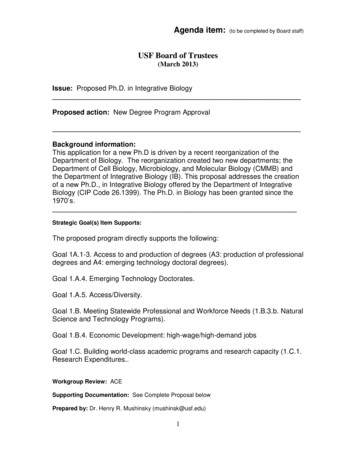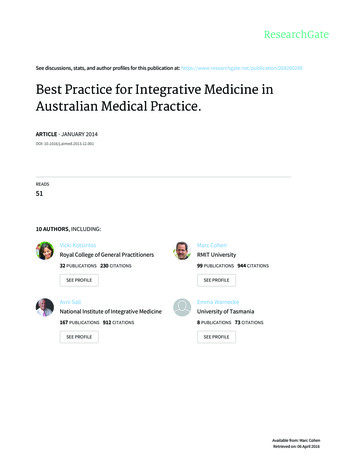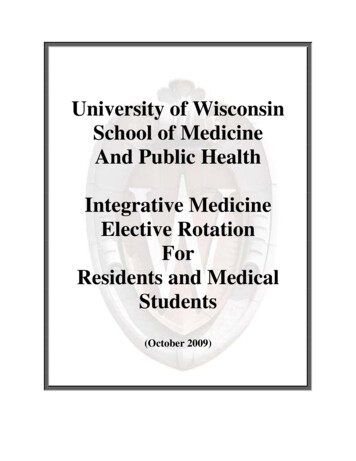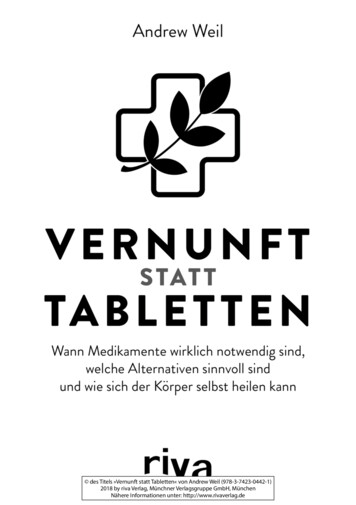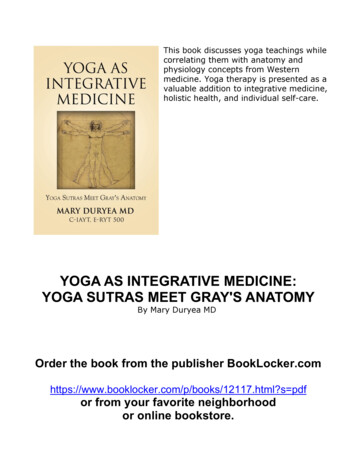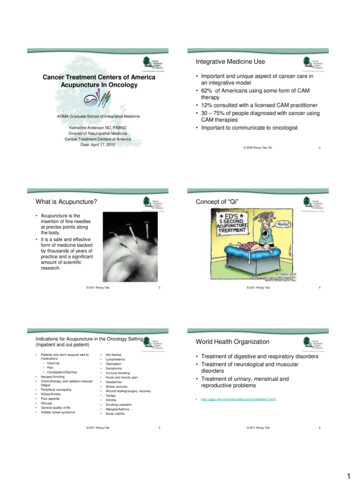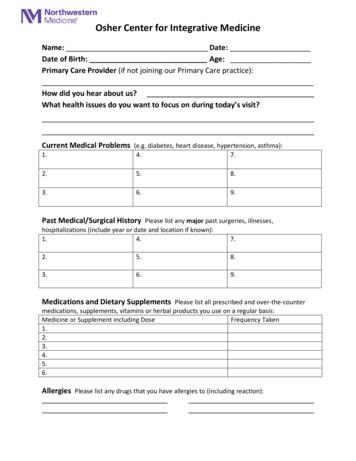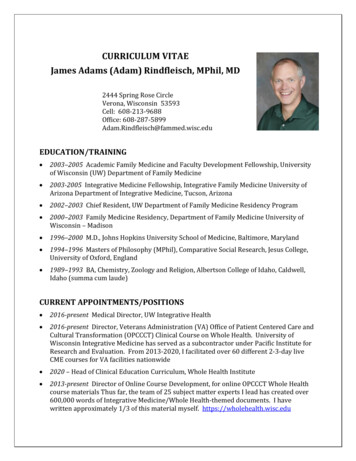
Transcription
h e a l t h s a g e s o n d h e i d 2 1 ( 2 0 1 6 ) 2 1 4 e2 2 7Available online at www.sciencedirect.comScienceDirectjournal homepage: http://ees.elsevier.com/hsag/default.aspSpecial Edition 2016An integrative review of Albertina Sisulu andubuntu: Relevance to caring and nursingCharlene Downing a,*, Marie Hastings-Tolsma baDepartment of Nursing, Faculty of Health Sciences, University of Johannesburg, Johannesburg, Gauteng, SouthAfricabInitiative for the Study of Normal Birth, Louise Herrington School of Nursing, Baylor University, Dallas, TX, USAarticle infoabstractArticle history:Background: Caring forms the core component of nursing. The history of the nature ofReceived 12 November 2015caring in South Africa is non-specific and is unknown. The impact of nurse and activistAccepted 7 April 2016Albertina Sisulu e known as the Mother of the Nation e has the potential to offer uniqueinsights into what could be the context of caring for nurses.Aims: The study aimed at 1) critically synthesising the available evidence of caring asKeywords:portrayed by Albertina Sisulu within the South African context, and 2) interpreting Sisulu'sAlbertina Sisuluwork within the Ubuntu philosophy as a framework for nursing and caring.CaringMethod: An integrative review was completed using Whittemore and Knafl's framework.UbuntuKey electronic databases, selected references and web-based search engines were scouredSouth Africafor articles meeting the inclusion criteria. This systematic and iterative approach yieldedIntegrative review18 non-research reports related to Sisulu; eight reports (three research, five non-research)Nursingrelated to ubuntu and nursing. Data was extracted that related to relevant and conclusiveMidwiferynew and innovative practices in caring.Results: The findings provided a context for practice guidelines of caring concerningknowledge and critical thinking about caring by nurses. Two primary factors emerged thatdemonstrated a culture of caring as seen through the prism of Sisulu's life: devoted dancerand creation of a healing environment. These factors also reflect African ubuntu principles,where the focus is on the relationships between people and how these relationships couldbe conducted.Conclusions: Ubuntu and Sisulu's approach to caring have much to offer for the nursingprofession in terms of developing of new directions for nursing pedagogy, curriculum,practice patterns, and policies that emphasise caring constructs.Copyright 2016, The Authors. Production and hosting by Elsevier B.V. on behalf ofJohannesburg University. This is an open access article under the CC BY-NC-ND nd/4.0/).* Corresponding author. Tel.: þ27 011 559 9063.E-mail address: charlened@uj.ac.za (C. Downing).Peer review under responsibility of Johannesburg 4.0021025-9848/Copyright 2016, The Authors. Production and hosting by Elsevier B.V. on behalf of Johannesburg University. This is an openaccess article under the CC BY-NC-ND license ).
h e a l t h s a g e s o n d h e i d 2 1 ( 2 0 1 6 ) 2 1 4 e2 2 71.IntroductionFew women have left such a strong legacy like the South African Albertina Sisulu e nurse, midwife, mother, and activist(Anonymous, 2009, 2011) (see Fig. 1). The struggles encountered by Sisulu were no doubt instrumental in shaping thevalues she stood for as she worked to create change for anation. There are few other concepts that have as muchrelevance to Sisulu's life and work than that of caring, a corecomponent of nursing and. midwifery.The history of the nature of caring in South Africa is nonspecific and is unknown. Sisulu's work, however, affords usthe opportunity to gain a unique insight into caring from aSouth African historical perspective. Also, the philosophy ofubuntu plays a role in the history of caring. Roughly translatedas “human kindness”, ubuntu is often interpreted as “humanity toward others” (Brack, Hill, Edwards, Grootboom, &Lassiter, 2003; Haegert, 2000; Mulaudzi, Libster, & Phiri, 2009;Murithi, 2009) and plays an important role in nursing.1.1.SisuluThe need to care for others began early in Albertina Sisulu'slife. The impact of the 1918 Spanish flu left her motherweakened and in need of assistance (Albertina NontsikeleloSisulu, n.d). Her service-orientation was further fuelled byher conversion to Roman Catholicism in her teens and a desireto become a religious nun. These events strongly influencedher work, both as a professional nurse and as midwife, as wellas her activism.Initially thwarted by economic hardship in her efforts tofinish school and become a nurse, Sisulu took to nursing “like215a duck to water” (Sisulu, 2003). A lifetime of caring for othersand self-discipline made her well-suited for work as a nurse.Completing her nursing education in 1944, she took a positionas a midwife at Johannesburg General Hospital where sheworked with Nelson Mandela's first wife, Evelyn, and herfuture husband's sister, Barbie (Albertina Nontsikelelo Sisulu,n.d). She received her midwifery qualification in 1954 and wassubsequently employed by the Johannesburg Health Department as a midwife. In this position she visited township patients on foot.Generous to a fault, her work as a nurse allowed her to bethe breadwinner and carer for three sons, two daughters, andtwo adopted children, as well as other extended family andgrandchildren. She appreciated education and this value wasreflected in the sacrifices she made to further the education ofthose she loved. Her Soweto home had a garden that has beendescribed as immaculate and supported a determination andgenerosity to feed every visitor e no matter how little was tobe had (Sisulu, 2003).Later professional work would find Sisulu working inSoweto beside Dr Abu Baker Asvat, a physician and leadinganti-apartheid activist who was murdered in 1989 (Layman).They were described as kindred spirits who sought to eliminate apartheid and improve the plight of those sufferingunder the apartheid state. The relationship between Asvatand Sisulu has been described as that of mother and son(Sisulu, 2003).Sisulu's adult life was dominated by poverty, sacrifice, selfdiscipline, racism, relentless persecution, detention, andworry about the health and wellbeing of those she loved(Sisulu, 2003). She quietly but fervently worked for justice andequality and she did so with a belief that women play a clearrole in creating social and political change; she called this aNontsikelelo Albertina Sisulu was born in 1918and died in 2011. She was a nurse and a SouthAfrican anti-apartheid activist who together withher husband, Walter, and friend Nelson Mandela,worked to create the new rainbow nation. Afounding member of the Federation of SouthAfrican Women in 1953, she was also a memberof the African National Congress Women’sLeague. Albertina was an organiser of the historic1956 march against pass laws, among othercritical involvement to end apartheid. Heractivism efforts resulted in an 18-year ban –longer than for any other South African. She alsoendured two years in jail. With the end ofapartheid, she was elected to the first democraticparliament in 1994, a tribute to her reputation andhard work.While now recognised for her quiet activism, lesshas been written about her work as a nurse. Shewas a gentle women who believed in creatingchange through peace. She cared deeply for herfamily and patients, and it was her caringpresence which helped in the birth of a newnation.Fig. 1 e Mother of the Nation: nurse and midwife Albertina Sisulu (Sisulu, 2003).
216h e a l t h s a g e s o n d h e i d 2 1 ( 2 0 1 6 ) 2 1 4 e2 2 7“petticoat layer” of women leaders (Albertina NontsikeleloSisulu, n.d.). Her abiding concern over the plight of womenand children (McGregor, 2011) reflected the ideals of nursingand midwifery.1.2.UbuntuUbuntu is both a world view and a moral philosophy thathistorically binds together African communities (Taylor,2014). The concept of ubuntu is found in diverse forms inmany societies throughout Africa (Murithi, 2009). Severaldifferent definitions, some of which are contradictory, make itdifficult to extract one central definition of ubuntu that wouldbe universally accepted (West, 2014). Irrespective of definition,Taylor (2014) suggests there are two basic aspects to Ubuntu:relationships between people and how those relationshipscould be conducted.Critics have suggested that the ubuntu philosophy servedas an effective framework which promoted standards formoral behaviour until eroded by Western values such asindividualism (Nyaumwe & Mkabela, 2007). At a time whenthe caring compass of professional nursing is being strained(Scott, 2014), Ubuntu values woven together with the ideals ofSisulu offer a clear lens through which professional expectations may be re-evaluated.The objective of this study is 1) to bring to the fore the work,life and way of living of Albertina Sisulu in order to create atheoretical basis for further development and application ofcaring within the discipline of nursing; 2) to compare care froma Sisulu perspective with that of the traditional South Africanphilosophy of ubuntu; and 3) to provide the South Africannursing community with greater knowledge for direct application of caring for nursing pedagogy, curriculum practice.2.MethodsA systematic search of articles written by and about AlbertinaSisulu and which related to caring and the impact on the workshe undertook was conducted, as well as a search of theliterature related to nursing and the philosophy of ubuntu.2.1.Data sources2.1.1.SisuluA comprehensive search of the literature was conducted usingthe databases of Ebsco, Cinahl, SABINET, SAepublications,ScienceDirect, Medline, Web of Science, ProQuest Dissertations and Theses, WorldCat, and web-based search engines.The search terms included the following: Sisulu, caring,ubuntu, United Democratic Front, apartheid, politics, policy,nursing practice, and health. In the final analysis, however,only “Albertina Sisulu” was used as it was distinctive andcaptured known key works; the search of other terms yieldedcitations of little or no relevance. Only sources published inEnglish between 1960 and 2015 were included. Table 2 identifies the 18 relevant sources used in the final review.2.1.2.UbuntuA literature search was conducted using Ebsco, Cinahl, SABINET. Africa-Wide Information, AMED e The Allied and Complementary Medicine Database, Business Source Complete,CINAHL, Education Full Text (H.W. Wilson), Family & SocietyStudies Worldwide, Health Source e Consumer Edition,Health Source: Nursing/Academic Edition, HumanitiesSource, MEDLINE, Political Science Complete and Women'sStudies. The search terms used were “nursing” and “ubuntu”.An initial search with the keyword “ubuntu” was performed. Afurther, more refined, search was conducted using thefollowing key phrases: principles of ubuntu, and relation tonursing. Seven sources published in English between 2000 and2014 were included. The relevant sources are included inTable 2.3.AnalysisThe analysis was guided by Whittemore and Knafl's (2005)updated integrative review method. The revised method, asderived from the expanding work of Ganong, is rigorous andwidely used for summarising and analysing data from diversemethodologies. This approach provides a comprehensiveunderstanding of a phenomenon (Pfaff, Baxter, Jack, & Ploeg,2013).Key electronic databases, selected references, and webbased search engines were scoured for articles that met theinclusion criteria. This systematic and iterative approachyielded 18 non-research reports related to Sisulu from whichdata was extracted with relevant and conclusive new andinnovative practice evidence detailed, and then this data wascompared to findings from the ubuntu search. All 18 Sisulusources and seven ubuntu sources were included in the review. A systematic and iterative approach was used to extractand reduce the data in order to be able to draw conclusions(Pfaff et al., 2013).4.Quality scoresAll reports were coded for methodological rigour prior to thedata reduction. A 3-point scale was used based on the qualitative and quantitative criteria of Letts et al. (2007) and Politand Beck (2012) respectively. A score out of three was allocated for methodological quality and the topic relevance ofthe article. An overall final score was allocated to each article(Pfaff et al., 2013). Tables 1 and 2 detail report scores, subconcepts and final concepts.4.1.Data abstractionsThis involved an iterative process of reading the sources andembracing the constant focus of the review aim. Examples ofessential features of caring from a Sisulu perspective and therelationship to ubuntu were sourced (Pfaff et al., 2013).
217h e a l t h s a g e s o n d h e i d 2 1 ( 2 0 1 6 ) 2 1 4 e2 2 7Table 1 e Essential features of caring from a Sisulu perspective.SourceRatingKey sub-conceptsMain concepts/metaphorsSteyn, 19981/3Tchervenkov et al., 20091/3Paine, 20002/3Michael, 20042/3Sisulu, 20041/3Anonymous, 20112/3Bhana, 2003Stevens, 20111/32/3Earl, 20112/3Seggie, 20111/3Geisler, 20042/3Being thereDignity of essPatience/cautionMother/female roleSurrogate to others/birth othersGraceSacred dutyStrength of characterShoulder burden/care for othersPerseverance through events (riding out darkness)TirelessCommitmentOrder/organisationWork ethicRespect for bodyDisciplined/self-sacrificeService to othersRight thing/behaviour mattersResponsibility/obligationPreserve lifeHonour your wordHonour tradition/wise sageWatch for things to improve (lights to shine)Faith/convictionChange agentPrincipled/competentGrowth/improvement (self as garden)Self-sacrificeLoyalFamily/community connectionsJustice/equalityUnitedMovementStanding in silence “struck a rock” (for caring/compassion)Gentle activistPeace/nonviolenceHonoured leader/change agentStrategy approach/seize the dayRisk for justiceNeed/value educationPendergast & Pendergast,20071/3Sisulu, 20033/3 Strength United Ground level Equality e towards a greater visionChildren: Co-operation Perseverance Compassion Rebirth Compassion Strength Movement Being there Lives Doing good Hagiography Service Mrs Sisulu's husband e metaphor Strong work ethic Perseverance Extraordinary strength of character Deep love for children Mother of the nation Leadership qualities Maternal instinct Defining moments of history Like a devoted dancer, you cannot separate from thedance Education Highlights e Family Change agent Strong faith, conviction and grace Support her family Leading role Inner “calling” e caring Characteristics Racial and gender inequalities Egalitarianism (p.70) Active, sustained participation (p. 70) Keeping “caring” at the forefront (p. 70) Need to be strong (p. 72) Women see world differently e need femalemodel of viewing caring (p. 72) Need to embrace gender role, nurturing, caring(p. 72): change through softness Need to transition from practical approach to astrategic approach (p. 72) Need acute awareness (p. 73) “Motherist” background e inextricably linkedwith gender role and caring (p. 78) “Seizing the hour” e balance between motheristsand feminists (conservative and radical activists)(pp. 78e79) Mother's love Commitment Kindness Caring Cleanliness Strong work ethic Compassionate and empathetic Preservation of life Sacred duty Bounty of the land; importance of growingthings .gardening passion (p. 24) Strong maternal instinct (p. 24)(continued on next page)
218h e a l t h s a g e s o n d h e i d 2 1 ( 2 0 1 6 ) 2 1 4 e2 2 7Table 1 e (continued )SourceRatingSisulu in Turok, 20061/3Sisulu, 20032/3Key sub-concepts Responsible for care of others (p. 24) and tookcharge Often chosen as umkhapi (maid of honour wholed the bridal entourage) (p. 26) Learned early and appreciated “serving others” eserving food, the community, etc.; Arrangedassistance for others (p. 26) Remembered as responsible (p. 27) Always took the lead (p. 27) Disciplinarian, serious-minded (p. 27) Took great exception when others made fun ofthose less fortunate (p. 27) e need to treat otherswith dignity Need for exemplary behavioUr .one of herstrongest messages: “Your behavioUr is the bestteacher .more powerful than anything you say.”(p. 27) [behaviour matters; power of behaviour] Honouring commitment and your word (p. 28) She was a surrogate mother to many others (p.29) Valued “ownership and respect for one's body”and appreciated the virginity inspections(“ukuhlolwa”) (p. 30) Honour of self-sacrifice e won a 4-year bursary tohigh school e had to decline to take care of family(p. 31) Honoured ritual and tradition (p. 32) Value of strict discipline (p. 33) Strong sense of obligation (p. 33) Kind women with strong sense of serving others(p. 76) Valued justice and the need to eliminate unjustand oppressive laws (p. 118) She helped birth a whole new generation ofwomen leaders (p. 152) Deep revulsion and distain for deliberate injustices (e.g. hated the Bantu Education) (p. 153) Sacrifice for principle (e.g. sent kids to 7th DayAdventist schools to avoid Bantu Education) (p.154) Standing in silence against pass laws “youhave tampered with the women, you have strucka rock!” Stood on principle to make things right (p. 168) Believed in need for resistance against the opposition (p. 172) “Winds of change” sweeping across Africa (p. 172) Orlando massacre triggered emotion to “wake upand unite” (p. 173) “Playing with fire” and peaceful opposition (p.182) Persistence Education Mother's love Commitment Kindness Bounty (p. 25) Relished growing things (p. 25) Strong maternal instincts and felt responsible forcare: (p. 25) Responsible for others, responsible for care (p. 25) Often led others on horse-entourage to weddingse the umkhapi (p. 26) Service-oriented — served food to others andsense of service to the community (p. 26) Arranged assistance to the aged and infirm Responsible elder who “always took the lead”(p.27)Main concepts/metaphors
219h e a l t h s a g e s o n d h e i d 2 1 ( 2 0 1 6 ) 2 1 4 e2 2 7Table 1 e (continued )SourceRatingKey sub-conceptsMain concepts/metaphors Disciplinarian, serious-minded (p. 27, 297e8) Strong sense of need to treat others with dignity(p. 27) Always reminded others that “behaviour matters” (p. 27) Behaviour is the best teacher and more powerfulthan anything you say (p. 27) Importance of honour, commitment and yourword (p. 28) The need to be a “surrogate” when others are inneed (p. 28) Importance of self-sacrifice (p. 31) Believed in instilling ownership and respect forbody ukuhlolwa. (p. 30) Raised with and believed in ritual izivivane (p.32) Orderly and organised Strict discipline Strong sense of obligation Smiling and pleasant (p. 76) Served others (p. 76) Believed in justice e even where it inconvenienced her own family e a price that had to bepaid (p. 76) She was part of the “winds of change” that sweptacross the continent Fierce opposition to injustice (apartheid) (p. 172) Stunned and outraged with massacres (p. 173) International loss of standing because of apartheid (p. 175) Nonviolence (p. 181) Need to play with fire to achieve racial equality Burden of being care provider all alone shouldered the burden along (p. 193) Vulnerable when it came to those she loved(lonely and exposed when separated from herchildren) (p. 196) Valued those who were highly principled andcompetent (p. 203) Understated (p. 203) Determination to be with those she loved whichoutweighed any fear (p. 206) Overwhelmed by loneliness and social isolation(p. 251) Never complained e stoic (p. 250) Wrote of the importance of community e ofbelonging and caring for one another (p. 251) Highly valued gardening as a source of sustenance; used it as a metaphor in communicatingwith Walter (p. 268/273) With Walter in jail, she kept vigil “until the lightsof South Africa shine again” (p. 281) Valued patience and caution to achieve resolution (p. 285) Importance of family connections (p. 293) Strong value of education as a way to improve life(p. 294e5) Watched her son's wedding from her front “garden” (p. 296) Hard worker e never rested e always busy andcleaning (p. 297) When times were tough and there was notenough to eat, she would go without so otherscould eat (p. 297)(continued on next page)
220h e a l t h s a g e s o n d h e i d 2 1 ( 2 0 1 6 ) 2 1 4 e2 2 7Table 1 e (continued )SourceRatingMcGregor, 20112/3South African HistoryOnline, 20152/3Key sub-conceptsMain concepts/metaphors Strict with children (to learn, do their chores, etc.)(p. 297e8) Unwaivering loyalty e waiting for Walter all thattime Viewed as quiet, wise sage (p. 348) Rode out the darkness of imprisonment andseparation (p. 362) Hospitality and care to be shown to visitors (p.558) Tireless in cause (p. 550e551) Tampered with women struck a rock Quiet, unassuming Strength, resilience Endured persecution, hardship Mother of the nation Human rights ideal Opposed inferior education (Bantu education) Suffered detention, bannings Strong maternal instincts Leadership qualities Determination Disciplined upbringing Took to nursing “like a duck to water” Caring for others Frugal Respect and dignity for all Equality in education Unity, solidarityRating: 1 ¼ low.2 ¼ Moderate.3 ¼ High.4.2.SynthesisA data matrix was applied to facilitate the synthesis phase.Categorisation was done by source, key sub-concepts, mainconcepts and metaphors, and ubuntu principles to identifypatterns and relationships among the data. The researcherenhanced further analysis strategies, noting relations between and among variables, looking for extremes of variantcases and finding intervening factors (Miles, Huberman, &Saldanha, 2012).4.2.1.Description of caringCaring forms the core in nursing and comprises the fundamental building blocks of the philosophy and science of caring. Caring of the human weaves together the essence andfibre of the tapestry of human-to-human caring in our profession. Watson (1988:58) describes an event in caring to bethe occasion where the nurse and patient encounter and cometogether in a human care transaction. The enactment ofdeeper caring in a caring occasion promotes self-actualisationin the person.The essence of being there for the individual and sharingthe moment of enlightenment and movement to a deeperconnection with self takes place during the caring moment.Life and living comprise many encounters during which thereis a connectedness between people, sharing of a commonspace, an exchange of energies that can bring about change,regardless of how miniscule or deep these changes are. Caringaffects the life of all people and a shared space for theauthentic meaning-making and unveiling of the inner purpose and vision of the caring moment is central to the criticalcaring moment (Hills & Watson, 2011).5.Findings5.1.SisuluA review of sources reveals Sisulu's deep commitment tocreating a culture of caring. This culture was based on a way ofbeing in a healing environment (see Table 3).5.2.Way of being in a healing environment5.2.1.The devoted dancerDuring her lifetime Albertina demonstrated a presence ofengagement in all aspects of community which can becompared to the synergy between dance, music and dancer.Her intuitive awareness of the needs of her community andthe wider population placed her in a unique position to provide the caring and help exactly where it was required. Sisuluhad a heightened awareness of the vulnerability of the peoplein a variety of situations and applied extreme care in her decisions and actions. She listened to the inner music of her
221h e a l t h s a g e s o n d h e i d 2 1 ( 2 0 1 6 ) 2 1 4 e2 2 7Table 2 e Ubuntu philosophy: primary concepts.SourceBrack et al., 2003Beets, 2012Haegert, 2000RatingKey sub-concepts PersonhoodHumanityHumanenessMoralityGroup solidarityBelongingness“seriti”: life force or potential“umhlangano”: interactive discussionwithout rankTrustRespect/equalityHave voice“imbizo”: gathering to cleanse the past“shosholoza”: work as one - teamworkReflective practiceEthicsCompassionEthical caring (vs natural caring):defined as a state of being in relationwith the other characterised by receptivity, relatedness, engrossment(Noddings, 2002)CommunityCompassion þ care ¼ foundation ofmoralityGentlenessHumannessStrength for the weakNeed to remember humanness ofpersonCommunity, collectivism (a communitysociety)BelongingnessWholenessValue of the individualFair, tolerantGiving the gift of personhoodPerson is centralNeed to nurtureProtective of the vulnerableLove from caringGiving to all patientsFreedom to actRespectDignityObligationMain concepts Humanity toward othersHuman kindnessSharing that connects humanity“a person is a person through otherpeople”‘Other’ as uniqueness and differenceRedistribution of wealthNeed for redemptionValue for dignity, compassion, respectOpen and available to othersAffirming othersHarmony, equality in relationshipsDoes not feel threatened that others areable and goodProtective of the vulnerableKnowledge that one belongs to a greaterwholeSelf-assurance that is diminished whenothers are humiliatedMaking others around you betterMulaudzi et al., 2009 Compassion Caring Complementing others Sharing Respecting Kindness Warmth Understanding Reaching out Wisdom “Ubuntu”: “a way of livingthat allows our goodness tocome forth” Humanness Embrace community/neighbourliness(continued on next page)
222h e a l t h s a g e s o n d h e i d 2 1 ( 2 0 1 6 ) 2 1 4 e2 2 7Table 2 e (continued )Source Responsibility Unity Tolerance ConscienceTaylor, 2014Murithi, 2009RatingKey sub-concepts In Ubuntu philosophy: an action is rightif it promotes cohesion & reciprocalvalue Collection of people Humanness Communalism Consciencism Ubuntu has 2 basic aspects: 1) relationships b/t people, and 2) how those relationships should be conducted Connection with ancestors/sages/wiseones Connectedness, ongoing fellowship Ubuntu community is comprised of thedead, the living, the yet-to-be born Respect Dignity Empathy Cooperation Harmony Scope suggests “the right way of living” Honouring relationships of sharing away of life Caring for others' quality of life Sharing Warmth Understanding Mutual obligation to “do good” Shared identity People as individuals—as well as connected to larger society Unity of humanity Empathy, sharing, cooperation 5 stages of peace-making process inubuntu societies: Acknowledging guilt Showing remorse & repenting Asking for and giving forgiveness Paying compensation or reparations as a prelude to reconciliation An approach to human relationshipbuilding Ubuntu can “re-inform and educate thenursing community across the globe .” Unity through diversity Ubuntu as generous, hospitable,friendly, caring, compassionate We “belong to a bundle of life” My humanity is inextricably caught upwith yours I am human because I belong, I participate, I share. Open, available to others, affirming I am humiliated when others are humiliated or diminished .and mybelonging is diminished when othersare not treated well As a human, my being is definedthrough interaction with othersMain concepts
223h e a l t h s a g e s o n d h e i d 2 1 ( 2 0 1 6 ) 2 1 4 e2 2 7Table 2 e (continued )Sourcevan Dyk & Nefale, 2005Whitworth & Wilkinson, 2013RatingKey sub-conceptsheart and the vulnerability of the people led her to care,nurture, and proceed with patience and caution. Elinor Sisulunoted the following:I never failed to be amazed by the way Albertina coped with aworkload that would exhaust most people half her age. After afull day at the surgery, she would return home to find local activists waiting to see her. Most days of the week, she would faceanother three to four hours of meetings before going to bed. Herweekends were also mostly taken up with meetings and frequentinterviews with local and overseas journalists, many of whomwere interested in the mobilisation of women under apartheid.“Ma Sisulu” as Albertina was affectionately known, infusedher life with the beauty of caring of people e a gift thatnurtured and guided healing to nourish humanity and to bepart of the greater civilization, living together harmoniously(Watson, 2012).Birthing of newness and for others by “the mother of thenation” lead to transformation within her community. Sisuluwas an activist and a professional nurse, who led a selflessand courageous life during which she showed an unwaveringcommitment to a non-racial philosophy of human equalityand dignity for all.5.2.2.Main concepts “inthewithprocessof dehumanisingThosetraditionalbeliefs believeanother,perpetratoris beinginexsickness theis retributionfromthe gods plorablyCan onlydehumanised”get rid of the punishment icesense ofshared destiny Ubuntuworks with individual AND family/communityUbuntu can culturallyre-inform nursing(connectedness)practice Communityis above individualTrust state of humanisation InnerEmphasis onessentialunity and inter Authentichumanexistencedependencehumanity and inter Emphasisonofcollectivenessdependent inseparable whole Strong emphasis on world view Respect for human beings Respect for human dignity and humanlife Collective sharing, obedience, humility,solidarity, caring, hospitality, interdependence, & communalism Community providing relationalcontext Emphasizes sharing, compassion, understanding, reciprocity, kindness, solidarity, sensitivityCaring through softness and gentlenessConnectedness and being part of a wider community played acritical role in Sisulu's life. The mothering role was fittinglybestowed upon her. She
Special Edition 2016 An integrative review of Albertina Sisulu and ubuntu: Relevance to caring and nursing Charlene Downing a,*, Marie Hastings-Tolsma b a Department of Nursing, Faculty of Health Sciences, University of Johannesburg, Johannesburg, Gauteng, South Africa b Initiative for the Study of Normal Birth, Louise Herrington School of Nursing, Baylor University, Dallas, TX, USA
